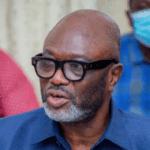
President of the Ghana Union of Traders Association (GUTA), Dr Joseph Obeng, has called for the immediate establishment of the Women’s Bank promised by government, warning that many small women-led businesses are collapsing under unbearable borrowing costs.
Speaking on JoyNews’ PM Express on Wednesday, Dr. Obeng said the high cost of credit at the microfinance level is trapping women traders in cycles of debt.
“Most of our women businesses are collapsing, always saddled in debt because the rate of borrowing at the microfinance level is so extensively high,” he said.
“By the turn of the year, they haven’t even paid half of the principal, and the debt is still accumulating. That’s why the Women’s Bank that the President has promised must be put in place, because our women folks are very important.”
He stressed that many women traders operate outside the mainstream banking system. “Most of them do not deal with the banks. They deal with susu people and microfinance, and it’s very worrying,” he added.
Dr. Obeng also raised concerns about the widening gap between official lending rates and what traders actually face.
“He’s saying that policy rate averages around 19 to 20 per cent. I’m going to hold him on that. I’ll do this research from the traders and bring this report because most of them say it’s around 25 per cent even at this time,” he said.
“If you say it’s 19, then the person out there might think their bank is taking advantage of them. Let’s publish these things so we can use them as a reference to bargain; otherwise, this thing is killing traders.”
He further urged the Bank of Ghana to act decisively to address what he described as unfair risk pricing by commercial banks.
“Bank of Ghana has to come in and regulate again. When they talk about risk, you talk about the Ivory Coast having 7 per cent, whereas Ghana’s is 21 per cent. It is because they do proper due diligence,” he explained.
Dr. Obeng also blamed corruption within the banking system for part of the problem. “Sometimes the corruption in the banks itself, when they do not do the necessary due diligence and corrupt themselves by going for some non-existing collateral, then they spread it across good and bad borrowers, which is very bad,” he said.
“If I’m doing well, then don’t spread your risk for all of us to pay. Bank of Ghana has to do something seriously about this.”
But Chief Executive of the Ghana Association of Banks, John Awuah, rejected the claim that the issue was simply about due diligence or corruption within banks. He said Ghana’s high lending rates reflect deep structural weaknesses in the economy.
“Half of the banks operating in Ghana are also operating in Côte d’Ivoire,” he said. “The same bank that lends cheaper there faces structural bottlenecks here — from the Lands Commission to the court system to credit culture.”
Mr Awuah added that Ghana’s banking system lacks a comprehensive credit tracking mechanism. “If Mr Obeng approaches a bank to borrow ¢100,000, all the bank could do is ask where else he has exposure. It’s word of mouth,” he explained.
“There is no mechanism for a 360 view of the customer. So the bank gives ¢100,000 thinking it’s for goods, but part goes to pay suppliers, rent, or arrears. By the time you realise, what you funded is gone. Where is he going to get the money to pay you back?”